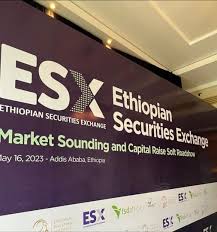The Ethiopian government is set to begin selling government bonds through the newly launched Ethiopian Securities Exchange (ESX) starting from July 2025, a move expected to boost domestic financing and reduce overreliance on external debt.
The announcement was made by Dr. Tilahun Kassahun, CEO of the ESX, during a high-level forum hosted by the Institute of Foreign Affairs on June 10, 2025. The event, themed “Fostering Renewed Connections Between the Economy and Foreign Affairs Sectors,” focused on enhancing economic diplomacy and creating new channels for foreign and local investments.
Dr. Tilahun revealed that the upcoming bond sales would primarily target Ethiopians in the diaspora and foreign investors, offering an investment opportunity that is not only profitable but also patriotic.
“There are many Ethiopians abroad who still don’t understand how government bonds work. Through this new capital market platform, we are extending an invitation to participate in a safe, rewarding, and meaningful investment in their home country,” he said.
The bonds, to be traded via the ESX platform, are expected to provide returns of over 16.5% annually, with some products offering as high as 20%, according to projections by the Ministry of Finance. Diaspora investors will be able to buy bonds remotely through designated accounts and repatriate both their capital and interest earnings back to their bank accounts abroad.
“For the diaspora, this may be the most accessible and high-return investment option on the table right now,” the ESX boss added.
Beyond high returns, the new initiative is part of a broader strategy by the Ethiopian government to shift from foreign debt dependency towards a sustainable domestic debt system. With Ethiopia’s national budget approaching two trillion birr, officials say traditional borrowing from pension funds and commercial banks is no longer enough.
“Previously, domestic borrowing was mostly done through short-term treasury bills. That worked when the budget was under 400 billion birr. But today, we need to widen the investor base to include both individual and institutional investors—local and international,” Dr. Tilahun explained.
He further noted that building a robust capital market is not just about numbers and digital platforms. It’s about creating a strong system for resource mobilization that directly supports national development.
Dr. Tilahun also hinted at foreign investors who are willing to take on local currency risk—something that reduces pressure on the country’s foreign reserves and provides breathing room for debt repayments.
“Unlike Eurobonds that demand repayment in hard currency, local currency investments delay forex obligations. Some investors in developed countries already do this by buying government bonds in local markets,” he added.
To expand participation, Ethiopia is exploring Islamic finance instruments such as Sukuk (Islamic bonds). The goal is to attract investors from the Gulf and Muslim-majority countries, using faith-compliant financial models.
“We are currently working with embassies in the Gulf region to make it possible for these investors to buy Ethiopian government and corporate Sukuk. This is a major step towards inclusive financing,” Dr. Tilahun said.
He also mentioned long-term plans to open Ethiopia’s capital market beyond bonds. The vision is to eventually attract institutional investors, including those setting up African-focused funds, similar to what is already happening in Mauritius and Rwanda.
“Over the next five years, we want to see a capital market that is vibrant, diversified, and internationally attractive,” he said. “We’re putting in the systems now to make Ethiopia the next investment destination on the continent.”
The government hopes this reform will strengthen the local economy, reduce debt pressure, and bring in new streams of revenue without depending heavily on external borrowing or aid.
